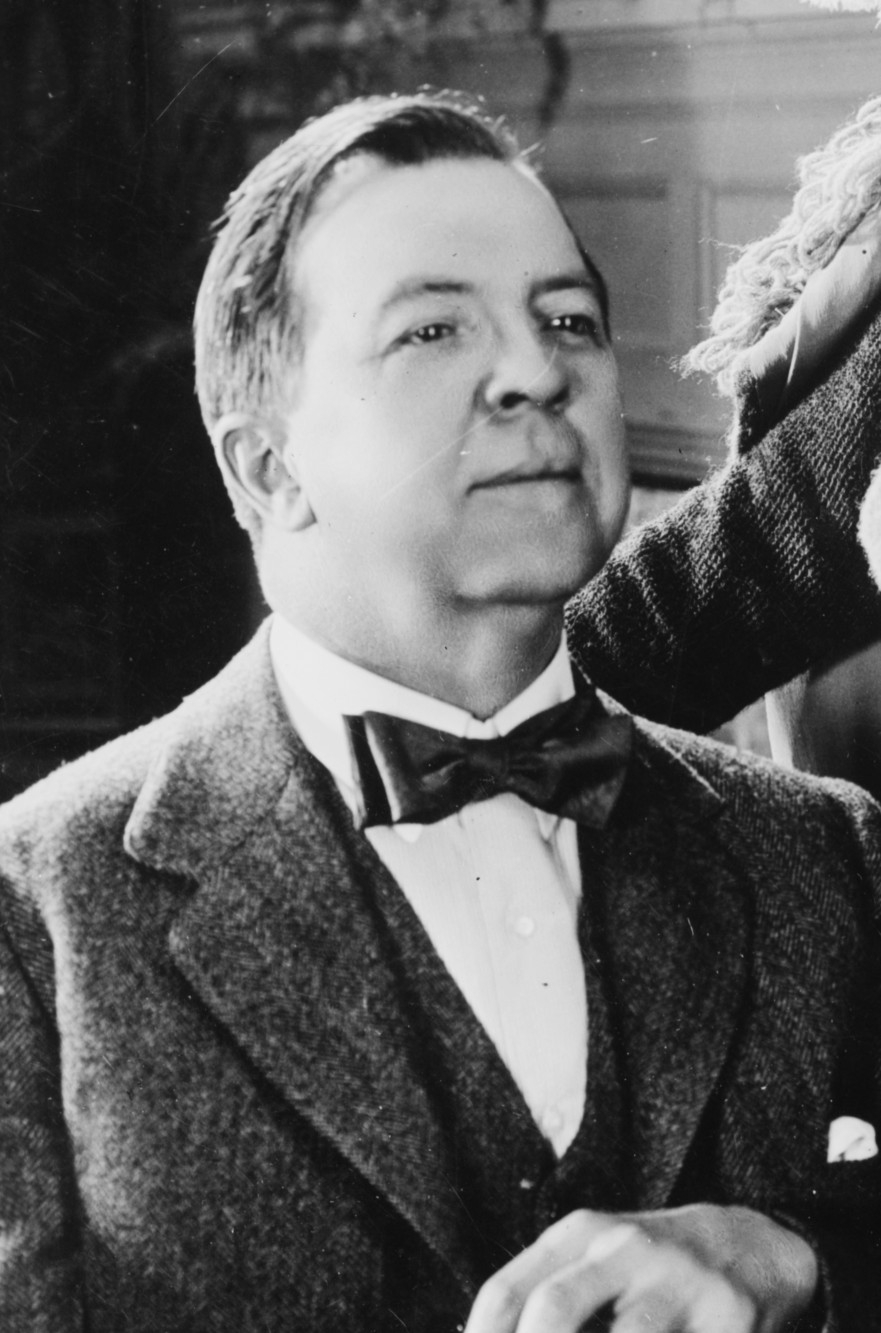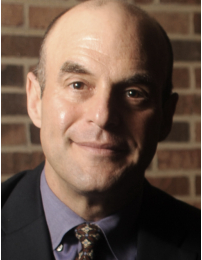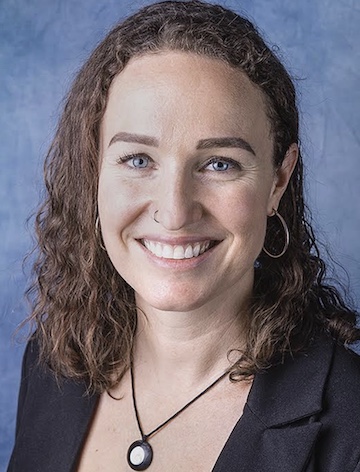January 31
Rupert Hughes

On this day in 1872, writer Rupert Hughes was born in Lancaster, Mo. The family moved when he was 7 to Keokuk, Iowa. He earned a B.A. from Adelbert College in Cleveland and a master’s from Yale, 1893. He served in the Spanish-American War and in the infantry in World War I. His biographical subjects included George Washington and Samuel Gompers. More than 50 movies were written, directed or based on Hughes’ stories and novels. He founded and served for decades as president of the Hollywood Screenwriters Club.
Hughes, the uncle of future billionaire Howard Hughes, had his greatest Hollywood success in 1928 when he was nominated for an Academy Award for Best Original Screenplay for “The Patent Leather Kid.”
Raised in the Congregational Church, Hughes began to lose his faith in college after reading the entire bible. In 1924 he wrote Why I Quit Going to Church, published by the Freethought Press Association, a forthright and thorough analysis of what is wrong with religion. In it Hughes recounted the uproar provoked by a shortened version of the 158-page book in Cosmopolitan magazine about the harm of Christianity. He wrote, “I quit because I came to believe that what is preached in the churches is mainly untrue and unimportant, tiresome, hostile to genuine progress, and in general not worthwhile. … As for the God who is preached in the churches, I ceased to worship him because I could no longer believe in him or respect what is alleged of him.”
He married Agnes Wheeler Hedge in 1893. They had a daughter, Elspeth, before divorcing in 1903. He married actress Adelaide Bissell in 1908. She took her own life in 1923 while on tour in Haiphong, French Indochina. Hughes’ final marriage, to Elizabeth Patterson Dial, took place the next year. She died from an accidental overdose of sleeping pills in 1945. Elspeth died a few months later from cerebral apoplexy.
Hughes’ health began to fail in the late 1940s, leading to a stroke in 1953. He suffered a fatal heart attack while working at his desk on Sept. 9, 1956.
“I do not believe in a Santa Claus for grown-ups, and I do not believe that the vast number of church-people are doing the world any good by promulgating false ideas and false ideals.”
— Hughes, "Why I Quit Going to Church" (1924)
Oksana Shachko

On this date in 1987, artist and activist Oksana Shachko was born in Khmelnytskyi, Ukraine. In 2008 she helped found FEMEN, a women’s rights group that garnered international notoriety for bare-breasted political protests. Along with the punk group Pussy Riot, FEMEN was part of the post-Soviet protest movement against corruption, wealth inequality, civil rights violations and the oppression of women and minorities.
According to the New York Times in 2018, “FEMEN members protested in Ukraine against sexual exploitation; in Davos, Switzerland — the scene of an annual conference of world political and business leaders — against income inequality; and, in St. Peter’s Square at the Vatican, against policies of the Roman Catholic Church, among other targets.”
In 2013 Shachko and other members of FEMEN were granted political asylum in France following persecution by Russian special services. Shachko claimed that due to FEMEN’s protests against President Vladimir Putin, pro-Putin agents had planted a grenade in front of her Kiev office along with a photo of Putin.
Shachko, who was interested in religious iconography from a young age, almost became a nun but was dissuaded from joining the nunnery by her parents. At the time of her death, she was working on an art installation entitled “Iconoclast,” wherein she painted traditional Orthodox icons, superimposing transgressive details and feminist messaging onto the icons in order to confront Orthodox religious dogma.
She was found dead at age 31 in her apartment in Paris after apparently hanging herself. (D. 2018)
“From this moment on, I began to reflect on what religion and faith mean to a human being. I found an answer, and it was atheism.”
— Shachko, profile in 032c, an English-language magazine published in Germany (2016)
John Lydon (Johnny Rotten)

On this date in 1956, singer-songwriter John Joseph Lydon (stage name Johnny Rotten) was born in London to Eileen (née Barry) and John Lydon, working-class emigrants from Ireland. The eldest of four brothers, he contracted spinal meningitis at age 7 and was hospitalized for a year. It caused what he calls the “Lydon stare” and was “the first step that put me on the road to Rotten.”
He struggled in Catholic secondary school and was expelled at age 15. He became friends with John Simon Ritchie (stage name Sid Vicious) and joined the punk rock Sex Pistols as frontman. Their 1977 single “God Save the Queen” was a hit and was included on the band’s only studio album, “Never Mind the Bollocks, Here’s the Sex Pistols.”
The band, now including Vicious, soon disintegrated, and Lydon formed a post-punk group called Public Image Ltd (PiL). PiL released eight studio albums between 1978 and 1992 and reconvened for albums in 2012 and 2015. Lydon co-wrote a track titled “Religion” for PiL’s first album in 1979: “There’s a liar on the altar / The sermon never falter / This is religion / Your religion.”
A Clash online profile of Lydon (May 21, 2010) reviewed his “epic rendering” of the song, to which he added, “I hate all religion! All religion! All institutionalized religion! I need no institution between me and my god/maker! I hate all religion!”
He was particularly bitter about one specific religion in a July 2010 interview about his mother with the BBC: “They treated ‘er very badly; they wouldn’t give ‘er [the] last rites when she died of cancer in the hospital, so we ‘ave a really bad, negative view, our family, of the Catholic Church.”
“I ain’t seen no evidence of God. Nowhere. Have you? God is probably Barry Manilow,” Lydon told The Guardian (Jan. 27, 2016).
He has published four books: Rotten: No Irish, No Blacks, No Dogs (1993), Punk: Chaos to Couture (2013, co-written with three others), Anger Is an Energy: My Life Uncensored (2014) and Mr Rotten’s Songbook (2017), a limited edition of 1,000 copies with all of his lyrics.
He holds British, Irish and American citizenship. He says he became an American citizen in 2013 because he “believed in Barack Obama” and laments how a “crazy, loony monster party” is trying to dismantle the Affordable Care Act. He says he has many problems with Donald Trump “as a human being” but defended how Trump has gotten people involved in politics: “I’ve been struggling for years to get people to wake up and do that.” (Pitchfork interview, March 10, 2017.) In October 2020, he told The Guardian newspaper that Trump “is the only sensible choice” and calling Joe Biden “incapable of being the man at the helm.”
In 1979 he married Nora Forster, a German publishing heiress. They are raising the three sons of Nora’s daughter Ariane, who died of breast cancer at age 48. As of this writing in 2019, they live primarily in Venice, Calif., and have a home in London. Lydon revealed in 2018 that Nora has mid-stage Alzheimer’s.
“ ‘Hark the herald angels sing’ is not a concept I can believe in. It’s a foolishness and therefore I think the only people who truly really do respect life and want themselves and others to live as long as possible are atheists.”
— Lydon interview, Huck magazine (March 29, 2017)
Cecilia Gentili

On this date in 1972, Cecilia Gentili — transgender activist, performer and author — was born in Gálvez, Argentina. She came out as gay at age 12 and as transgender at 18. Her mother, Esmeralda del Pilar Ceci de Gentili, cleaned houses and was prone to depression. Her father, Terdinando Gentili, was a butcher who reportedly spent more time with his mistress than at home. The family struggled financially.
Gentili was molested for years by a neighbor, starting when she was 6. Sex became a survival mechanism, she later said. She was close to her Indigenous maternal grandmother, who took her to church. Both stopped attending after the Baptist pastor berated them for letting Gentili wear her grandma’s jewelry. “That was the end of church,” Gentili wrote in her 2022 book “Faltas: Letters to Everyone in My Hometown Who Isn’t My Rapist.”
Enrolling in college in Rosario, she met trans women for the first time, and with hormones began transitioning. Tired of being bullied and assaulted and unable to get a job outside of sex work, she left for the U.S. in 2000. More sex work in Miami and New York and heroin addiction followed, but after serving several jail sentences, she was able to get clean and was granted asylum. She became a U.S. citizen in 2022.
An internship with the LGBT Community Center in Lower Manhattan led to a position from 2012-16 with the Apicha Community Health Center developing transgender health services. The program expanded from serving 27 patients in 2012 to over 500 in 2016.
Working from 2016-19 at GMHC, founded as the Gay Men’s Health Crisis, she rose to managing director of policy. Asked in a 2017 interview with TheBody (HIV-related news and information) how she got from incarceration and addiction to directing policy, Gentili said, “I wish I could tell you that it was God, but I don’t believe in anything.”
She founded Decrim NY, a coalition working to decriminalize and destigmatize sex work, and Trans Equity Consulting in 2019. Her one-woman show “The Knife Cuts Both Ways,” called a “hilarious and raunchy” autobiographical take on a trans woman’s multicultural experience, opened in 2018 at Dixon Place on Chrystie Street in Manhattan. She had a recurring, guest star role in “Pose,” an FX drama that ran for 26 episodes in 2018-21 and explored the LGBTQ+ ballroom dance culture in the 1980s and ’90s.
Another one-woman show, “Red Ink,” debuted Off-Broadway in 2023. She introduced each of about a dozen vignettes with “I’m an atheist, but …” and went on to explain how she met what could be described as God where she least expected it. “As I left the show, I was struck by the sensation that God can be everywhere you look — even on a stranger’s dick,” wrote a reviewer on Condé Nast’s Them online.
She was a plaintiff in a 2020 challenge to the Trump administration’s erasure of protections under the Affordable Care Act for gay and transgender patients. Gentili’s essay “Tango Between Two Worlds” was included in the 2023 anthology “Surviving Transphobia” edited by Laura A. Jacobs.
“Religion is such a complicated issue for most queer and trans people,” Gentili said near the end of her life in 2024. “I used to go with my grandmother to the Baptist church, and they didn’t want me there. They made it very clear. I used to go to the Catholic church, too, and both were such traumatic experiences for me as a queer person. So I came to identify as an atheist, but I know that so many trans people have been able to find a relationship with faith in spaces that include them.” (Interview magazine, Nov. 1, 2023)
Gentili’s death at age 52 at home in Brooklyn was announced by Peter Scotto, her longtime partner. Two men are criminally charged with supplying drugs that an autopsy showed caused her death: heroin laced with fentanyl. Hundreds of people turned out for her funeral presided over by a Catholic priest at St. Patrick’s Cathedral, a historic Fifth Avenue church.
The Archdiocese of New York and conservative Catholics went ballistic when they found out about the ceremony. Spokesman Joseph Zwilling and others condemned “the behavior of some of those in attendance at the funeral — including comments like ‘the mother of all whores’ or changing the words of the ‘Ave Maria,’ a sacred hymn, to ‘Ave Cecilia’ to cite just two examples.” (Washington Post, Feb. 18, 2024)
Cardinal Timothy Dolan gave a directive for a Mass of Reparation to be offered to atone for the “sacrilege” at the cathedral. (D. 2024)
“Cecilia Gentili is an atheist. But God won’t give up on her. Unfortunately, neither will Satan.”
— Theatre Development Fund description of her autobiographical show "Red Ink" in 2023
Peter Sagal

On this date in 1965, Peter Daniel Sagal — humorist, writer and radio host — was born to Jewish parents and was raised in Berkeley Heights, N.J. His mother Reeva was a teacher with a master’s degree and later a stay-at-home mom. His father Matthew was a telecommunications executive.
Sagal says his family was “fairly observant” of Judaism and he started attending Hebrew school at about age 7. “But it didn’t take, to put it mildly. What’s interesting is I had exactly the same Jewish education with the same people in the same institution as my older brother who is now and has been professionally a rabbi. … But I think after my bar mitzvah, I remember just asking questions about like, why do we have to do this? And if that’s true, what about this?” (“Preach” podcast, Nov. 27, 2019)
He told the Times of Israel in 2013 that “I had always been one of those people: a classic class clown, who made up for his insecurities and his lack of athletic and/or other abilities by being funny.” After high school, he attended Harvard University and earned a degree in English literature. He co-wrote the script for a Hasty Pudding production titled “Between the Sheiks” featuring a genie whose signature song was “You Rub Me the Right Way.”
He honed his theatrical, comedic and overall writing chops — screenplays, scripts, plays and columns about marathon running — while living in several cities, including Los Angeles, New York, Minneapolis and Chicago. His odd jobs included working as an extra in a Michael Jackson video. He married actress Beth Albrecht in 1994. They had three daughters — Rose, Grace and Willa — before divorcing in 2013. He married Mary Filler, a stage manager, in 2018. Their son Elliott was born in 2020 when Sagal was 55.
He got a phone call in 1997 asking him to be a panelist on a new National Public Radio game show called “Wait, Wait… Don’t Tell Me.” The next year he replaced the host and as of this writing in 2023 still hosts the show. Well-known or celebrity contestants answer questions about recent news. The show won a 2008 Peabody Award.
Sagal says the Groucho Marx program “You Bet Your Life” (1947-60) was a big influence: “I feel like I’m from a long line of Jewish fake quiz show hosts.” A 2014 episode raised religious hackles when Sagal joked about a Catholic Christmas ad depicting a young woman taking a selfie with an image of Jesus behind her. He asked why Jesus didn’t just take the photo for her, and answered “His hands were occupied.” Sexual or crucifixion reference, Catholics wondered? NPR issued regrets that an attempt to poke fun at the news “didn’t succeed in this case.”
Sagal in 2007 published “The Book of Vice: Very Naughty Things (and How to Do Them),” described by Publishers Weekly as a “hilarious, harmlessly prurient look at the banality of regular people’s strange and wicked pleasures.” The title of Sagal’s “The Incomplete Book of Running” (2018) riffed on the 1977 James Fixx classic “The Complete Book of Running.”
He calls himself a cultural Jew who identifies “with our traditions and our food and our attitude. I just don’t go to synagogue. And the Jewish tradition is one of inquiry and scholarship and study. So it’s as if Judaism has given us Jews the tools with which we then use to exit Judaism. … I’m an agnostic, which is what an atheist says if you’re afraid God will be mad.” (Ibid., “Preach” podcast)
LEE HALE: “Do you find yourself ever thinking about God?”
SAGAL: “Relatively infrequently? I’m enamored of science and the scientific method and, you know, the deeper you go into that, the less and less God is necessary.”— Interview, "Preach" podcast (Nov. 27, 2019)
Megan Phelps-Roper

On this date in 1986, former Westboro Baptist Church member Megan Phelps-Roper was born in Topeka, Kansas, the third of 11 children born to Shirley Phelps-Roper and Brent Roper. Her mother was one of 13 acknowledged children of Westboro founder Fred Phelps, a practicing attorney who founded the church in 1955 as a Primitive Baptist/Calvinist congregation. Most of the 100 or so congregants were also family members who lived in a compound in Topeka.
Shirley Phelps-Roper was spokesperson and coordinated picketing the church started in Kansas and around the country in the early 1990s. Its website with its notorious message of “God Hates Fags” was prominently displayed on signs along with other hate speech citing biblical authority. The website was still active as of this writing in 2024 and included over 20 scheduled protests that May and June, mostly at college and high school graduations.
“I picketed my own high school graduation before I walked in,” Megan said with a laugh to a Connecticut Jewish group in 2016, four years after she left the church. “We thought it was our duty to go and warn people of the consequences of their sins, and I understood that to be the definition of loving our neighbor. We would always say the sign doesn’t say anything about our personal hatred – it’s talking about the hatred of God.”
Westboro has celebrated AIDS, hunger, the Sept. 11 attacks and other tragedies, including the Sandy Hook school massacre. Westboro announced it would protest school memorials with signs saying “Pray For More Dead Kids.” Others: “Thank God For Dead Soldiers” and “Thank God For IEDs.” Megan celebrated on 9/11 and later said Westboro believed God was punishing America for embracing homosexuality: “Soldiers Die, God Laughs.” Westboro eventually also targeted Jews. (Daily Mail, Oct. 5, 2019)
She had held signs as a 5-year-old and as a budding teen argued online with Westboro detractors. She has admitted her upbringing was harsh, mentally and physically, but she still embraced church beliefs and its interpretations of the bible. “It was abusive – there’s no question in my mind it was. Gramp’s policy was to beat first, ask questions later.” (New York Times, Oct. 8, 2019)
Deaths of some famous persons were celebrated. Princess Diana and Mother Teresa died within a week of each other when Megan was 11. “And I, modeling what my grandfather had said, you know, I said, ‘Two whores in a week.’ ” (“Fresh Air With Terry Gross, Oct. 10, 2019)
While discipline was harsh and picketing was stressful, church members otherwise lived fairly normal lives, shrugging off being pelted by counter-protesters at times with eggs, tomatoes, urine and feces. Children attended public schools and education was a priority. Megan ran track in high school. “The Westboro students had a reputation for being diligent and polite in class, but at lunch they would picket the school, dodging food hurled at them by incensed classmates.” (The New Yorker, Nov. 15, 2015)
“My mom and her siblings and many of their spouses are attorneys. They’re very intelligent, and their arguments are well-crafted and tightly woven. And so they always had an answer. There was always a bible verse to justify [their extreme rhetoric].” (Ibid., “Fresh Air”) Megan graduated from Washburn University in Topeka and worked for her family’s law firm.
She started engaging with critics, including her future husband, on Twitter in 2009, which gradually made her consider opposing views. An older brother had cut ties with the church several years before, as had her uncle Nate Phelps and three of his siblings long before that. In 2012, she convinced her sister Grace, seven years younger, to leave the church with her during Grace’s sophomore year at Washburn. They ended up in Deadwood, S.D.
An internal power struggle had led to Fred Phelps’ loss of influence. He was later excommunicated and Shirley was also removed from her coordinator position. He died in 2014 at age 84. Megan’s younger brother Zach left the church later that year. It’s all detailed in sometimes chilling detail in her 2019 memoir “Unfollow.”
Six months after leaving Kansas, Megan went on a date with Chad Fjelland, who she’d engaged with on Twitter and is an attorney in eastern South Dakota. After marrying, they had a daughter, Sølvi Lynne, born in 2018, and a son, Tor Bjørn, born in 2022.
Megan started speaking at events which she had previously protested. She gave a TED Talk in 2017 about Westboro and her decision to leave. As a guest in May 2021 on FFRF’s “Freethought Matters” talk show, she said: “I’d spent more than two decades of my life on this earth, targeting people and antagonizing people, believing that it was the right thing to do, and believing that I was showing love to people in doing so. Suddenly, it felt impossible to come to terms with the harm that we had wrought.”
She was the recipient in 2021 of FFRF’s Henry H. Zumach Freedom From Religious Fundamentalism Award, which Nate Phelps had received the year before for taking a stand against religious intolerance and bigotry.
“I don’t really believe in God anymore. I don’t like to say I’m not a believer, because I’m a believer in a lot of things, primarily hope, and grace and the power of human connection. But God? No.”
— KMBC News interview (Nov. 26, 2019)
